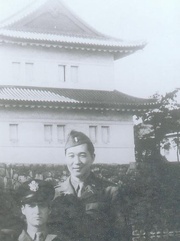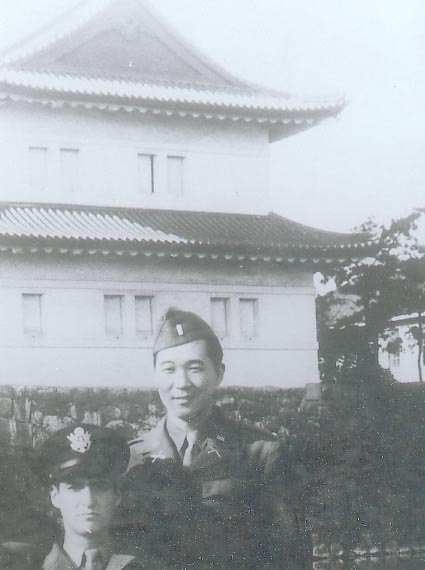
Banco de Dados da Experiência Militar Nipo-Americana

Toshio George "Tusky" Tsukahira
Sexo
Male
Birth date
1915-12-22
Local de nascimento
Los Angeles CA, USA
Inducted
1944-07-09, Ft. Snelling MN
Tipo de alistamento
Volunteer
Ramo das Forças Armadas
Army
Tipo de serviço
War,peacetime
Tipo de Unidade
Support
Unidades onde serviu
Pacific Military Intelligence Service Research Section, Camp Ritchie, Maryland
Washington Document Center, Washington, D.C.
Occupation forces, Japan.
Military specialty
Intelligence Officer
Stationed
USA: Camp Ritchie, MD; Washington Document Center, Washington D.C.
Other Countries: Washington Document Center (Advanced), Tokyo, Japan
Separated
Ft. Dix NJ
Unit responsibility
Military intelligence research (translation of captured Japanese military and strategic documents) for the U.S. War Department.
Personal responsibility
Translation control (checking and editing raw translations of Japanese documents).
Supervision of translation work.
Living conditions
All stateside service was in standard U.S. Army barracks with the usual amenities (or lack of them). Off duty time was spent in the officers' club on post or with my wife in Washington, D.C. on weekends.
In Tokyo, I was billeted with other military intelligence officers in the NYK Building, Marunouchi. Entertainment was non-existent in those early occupation months.
I returned to Washington D.C. in the spring of 1946 and lived with wife and child in my own suburban apartment.
Most vivid memory of military experience
My first sight of the devastated face of Tokyo in November 1945. I had spent three happy years there from 1933 to 1936 as a student at Meiji University. The shock of seeing that familiar city in utter ruin was tremendous.
Missed most whilst in the military
I was fortunate in that I had nothing but good assignments and was engaged in meaningful work. However, I did join the military in the first place to participate in the overseas action.
Most important thing, personally, to come from military experience?
Volunteering for military service from an exempted civilian job was prompted by a genuine desire to serve my country and to contribute more directly to the war effort. Despite the emphasis today on the 'felt need' of Japanese Americans to vindicate themselves, the dominant motivation for me was not to be deprived of the opportunity for honorable service.
Additional information
I was one of eight civilian instructors at the Army's Japanese language school at the Presidio of San Francisco. I learned my Japanese as a student at Meiji University in Tokyo from 1933 to 1936. I had received my B.A. and M.A. and was a teaching assistant at UCLA when I was hired as a civilian Japanese language instructor. After discharge from the Army in 1946, I pursued my academic career with studies and teaching at Harvard and at U.C. Berkeley. I was eventually recruited by the State Department and became a Foreign Service Officer with tours in Tokyo, Japan; Fukuoka, Japan; Bangkok, Thailand; and Washington, D.C.
After his retirement in 1975, he taught at several major universities and institutions and undertook translating, writing, and consulting agreements. He is the author of, among others, Feudal Control in Tokugawa Japan; the Sankin Kotai System.


